
Holy shit, he's glowing
Challenges in Congress
Perhaps nowhere has Mr. Cheney’s shifting influence been more visible than on Capitol Hill, where the vice president’s ability to win his way without challenge — a luxury he enjoyed through much of the first term — has evaporated.
In the first four years, Mr. Cheney often bypassed Congress on issues like detention policy.
He and Mr. Addington began to pave the way for the reassertion of executive power that they had long talked about. Mr. Cheney took control of crucial intelligence-gathering programs, including the one that involved eavesdropping on conversations between suspects in the United States and their overseas counterparts without getting a warrant from a special court set up by Congress for such cases.
“They have a view of executive authority that basically smothers the other two branches,” said Senator Lindsey Graham, a South Carolina Republican who found himself at odds with Mr. Cheney on detention and interrogation policy.
But in the second term, whether the issue was the treatment and prosecution of terror suspects or Congressional oversight of domestic spying, Mr. Cheney has been forced into an unhappy retreat.
The Supreme Court’s recent ruling struck at the heart of Mr. Cheney’s goal to expand presidential powers. By mid-July, it prompted the White House to concede that terror suspects had a right under international law to basic human and legal protections under the Geneva Conventions.
Similarly, Mr. Bush’s announcement on Wednesday amounted to an opening gambit in negotiations with Congress over the rules of tribunals, in what could amount to bargaining over the scope of Mr. Bush’s powers.
Mr. Hadley said in an interview that in recent weeks Mr. Cheney had offered advice to Mr. Bush about how to deal with the court’s decision. But Mr. Hadley, not Mr. Cheney, has been acting as negotiator with Congress, a decision that administration officials said reflected the rockiness of the vice president’s relationship with Republicans on Capitol Hill.
Mr. Cheney discovered the depth of that opposition last summer, when Republicans began to rebel against the White House after he tried to block a bill by Senator John McCain, Republican of Arizona, that would bar cruel and inhumane treatment of all prisoners in American custody.
In a tense, 30-minute meeting in July 2005, Mr. Cheney scolded three Republicans — Mr. McCain, Mr. Graham and Senator John W. Warner of Virginia — for proposing legislation that he said interfered with the president’s authority to protect Americans against terrorist attacks.
But the senators did not budge despite the threat of a veto. “The three of us were firmly of one view, he of another,” Mr. Warner said.
After the Senate and the House voted overwhelmingly against Mr. Cheney’s position, the White House decided that the vice president had become so radioactive that his interventions were losing votes, rather than winning them, White House officials acknowledge. So Mr. Cheney stepped aside, and the less ideological, more lawyerly Mr. Hadley was sent to deal with Mr. McCain. The result was a deal that Mr. Cheney had previously rejected.
The White House also appeared to yield this summer when it agreed to allow a secret intelligence court to rule on the constitutionality of the National Security Agency’s program of eavesdropping without warrants. Civil rights groups and lawmakers from both parties have since criticized the agreement and cast doubt on whether it will be approved by Congress.
No comments:
Post a Comment